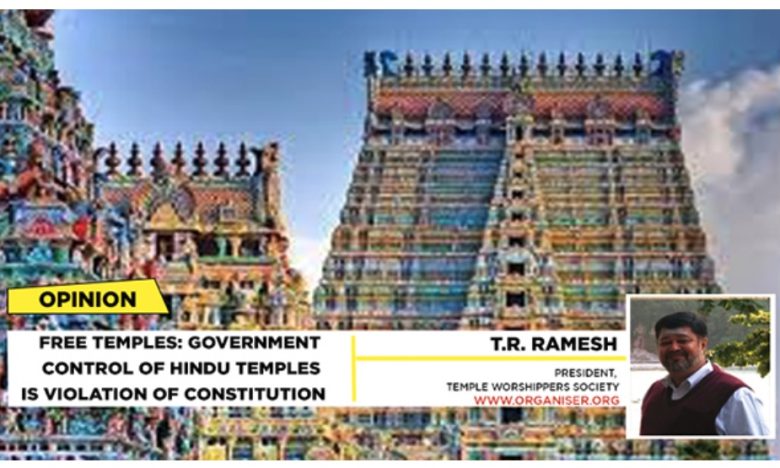INDIA, August 29, 2023 (The Organiser, by T. R. Ramesh): Government control over places of Hindu worship across India is in violation of constitutional provisions and various court orders. Yet it continues. In Tamil Nadu alone, 400 temples and their valuable properties have been suffering colossal mismanagement and annual losses of thousands of crores for over 70 years now. The Indian Constitution which came into force on January 26, 1950, guarantees fundamental religious rights to its citizens under Articles 25 and 26. Article 25 gives every individual the right to profess, practice or propagate his or her religion. Article 26 is the fundamental right available to every religious denomination to maintain and establish religious institutions; decide religious matters without any external interference; own and acquire properties and administer such properties in a lawful manner. The Constitution bestows these rights equally to all, irrespective of majority or minority status. Unbelievable as it may sound, these rights have been denied only to the majority i.e. the Hindus.
Almost every State Government in independent India has enforced special code or laws or Acts by which Hindu religious institutions viz. temples, mutts and charities (endowments) are controlled, if not fully administered, by the respective State Governments – leaving the Hindus and their communities, sects, etc. to have no say in these matters. Tamil Nadu is the Land of Temples. At least 400 temples here are more than 1000 years old – the icons and symbols of Sanatan Dharma. Before independence, Tamil Nadu was part of the Madras Presidency which also comprised today’s northern Kerala, Lakshadweep, coastal Andhra, certain districts of Karnataka and even southern Odisha. It was in this Presidency that the first arbitrary law to control Hindu religious institutions was enacted. It was called the Madras Religious Endowments Act, 1926 (ACT II of 1927). This 1926 Act is the forefather of all the Religious Endowments Acts (meant only for Hindu institutions) which each State enacted in the “Republic of India”. By 1935, the said 1926 Act was further amended and the administration of many large temples in the Presidency – particularly in the Tamil Nadu region – were taken over by the provincial government by notifying such temples in the Government Gazette.
Much more on this complex issue at source.
https://organiser.org/2023/08/29/192780/bharat/free-temples-government-control-of-hindu-temples-is-violation-of-constitution/#:~:text=Government%20control%20over%20places%20of,for%20over%2070%20years%20now
A daily summary of world news for Hindus and non-Hindus alike

